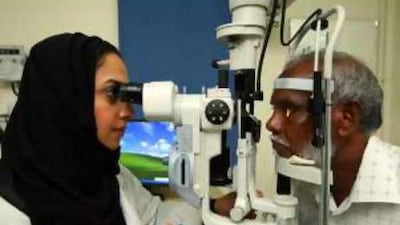DUBAI // A national committee set up to tackle preventable blindness is to launch a mobile eye hospital by early next year to save the sight of people living in remote parts of the country. The clinic is being installed in a bus that will travel throughout the UAE, enabling volunteer doctors to provide eye care and sight screening, support local health care providers and conduct training and awareness campaigns.
Residents of isolated areas are often lax in seeking preventive eye care, according to Dr Manal Taryam, a member of the National Committee for Prevention of Blindness and the president of the Emirates Ophthalmic Society. One of the goals of the initiative, part of an effort to eliminate preventable blindness in the country by 2020, was to educate people about caring for their sight and to encourage them to attend regular screenings, she said.
"We are aware that there are a large number of people in the country with reversible or avoidable blindness," said Dr Taryam. "But the problem is that they often wait until they are legally blind before seeking help. We realised it is easier to reach out to them." When completed, the bus will be equipped with an operating theatre for procedures that do not require general anaesthetic. Because training is part of the project's brief, doctors in the areas visited by the clinic will be invited to observe operations.
"We will also be teaching and updating the skills of the doctors in the remote areas so they can continue to provide the services," said Dr Taryam. The clinic's visits would be announced one month in advance and, when the bus visits an area, it is expected to be stationed at schools or stadiums easily accessible to people from the region. "Through the screening process, we hope to cover the entire area and to treat people," said Dr Taryam.
"We really need to reach everyone. We also plan to invite international experts to work with us to further update skills." The service will operate on a non-profit basis and the committee is close to signing with a sponsor to cover the initial start-up costs and expenses for the first year. However, with plans to extend the service to other countries in the Gulf region, it is hoping to raise further funding for the project.
Other countries have similar mobile eye-care services, while the Orbis Flying Eye Hospital, which stopped over in Dubai in June, has taken the concept to an international level. Since the first Orbis flight took off in 1982, the organisation has treated 6.8 million people, travelled to more than 86 countries and trained 195,000 health care professionals. "The idea is very similar to Orbis and we met them when they were here to learn from their experiences," said Dr Taryam.
According to the committee, which was founded in 2004, the most common cause of reversible blindness in the UAE is cataracts, followed by diabetic retinopathy and glaucoma. "Generally, people don't come for screening, they just come to us when the damage has been done," said Dr Taryam. "Many people have no idea that a 15-minute operation on someone with cataracts can result in 6/6 [20/20] vision again."
By the end of the year, the committee hopes to have established a registry of people with visual impairments to help it to ascertain the full scope of the problem in the country. It also has the longer-term goal of establishing the UAE's first school of ophthalmology. @Email:zconstantine@thenational.ae

